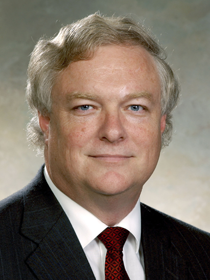
Melvin “Ralph” Carruth Jr.
2011 Distinguished Alumnus
Melvin “Ralph” Carruth Jr. grew up near Malvern, graduating from Poyen High School in 1971. He earned a bachelor’s degree in physics at UCA in 1975, and his first master’s degree in physics from the University of Arkansas in 1978. In 1989, he completed a master’s in theoretical physics at the University of Alabama in Huntsville. His career began at NASA’s Jet Propulsion Laboratory where he worked in ion propulsion and associated interactions with spacecraft.
Mr. Carruth is currently associate director of engineering at NASA’s Marshall Space Flight Center (MSFC) and has made significant contributions as a researcher and technical leader. As part of the senior engineering directorate management team, Mr. Carruth oversees and manages the work of approximately 2,500 individuals forming one of the premier engineering organizations in the federal government. This work includes the space shuttle propulsion system with the external tank, space shuttle main engines, and reusable solid rocket boosters; International Space Station (ISS) environmental control hardware, 24/7 payload operations and experiments; development of the United States next generation launch vehicle as well as many other spacecraft, science instruments and payloads.
His 32-plus year career has focused on laboratory experiments and aerospace engineering. In 2002, he was selected for the Senior Executive Service, the highest civilian rank in federal government and equivalent to the military rank of General. Mr. Carruth has collaborated with officials and researchers with the Russian Space Agency, the Italian Space Agency and the European Space Agency to promote cooperation on an international level. He is currently the lead of the Materials and Processes Steering Committee, a NASA wide engineering team reporting to the NASA Office of Chief Engineer.
He is recognized as an authority on high voltage system interactions with the space environment, the effects of the space environment on spacecraft function and on materials and manufacturing development. He has been recognized through numerous awards from NASA and the American Institute of Aeronautics and Astronautics (AIAA). Most notable include Associate Fellow of AIAA, Herman Oberth Award 2000 for Outstanding Individual Scientific Achievement presented by AIAA’s Alabama/Mississippi Section, NASA Outstanding Leadership Medal in 2010, NASA Exception Servicer Medal in 1997. He also has served as a member of the UCA College of Natural Sciences and Mathematics Advisory Board.
